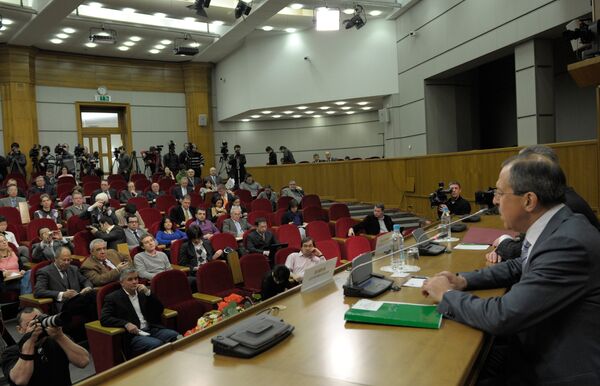There is always a question about Iran at Russian Foreign Minister Sergei Lavrov's traditional January news conference. This year it was about Iran's invitation of a group of select countries to tour its nuclear facilities, which have been a source of concern for the international community for years.
Handpicking the guests
On January 7, Iran invited representatives of what it sees as the more receptive countries to tour its nuclear sites. The list includes Russia, China, the European Union (or to be more exact Hungary, which currently holds the rotating presidency), Cuba, Syria, Egypt, Algeria, Venezuela and a representative from the Group of 77, an association of developing countries.
If this move by the Iranians is successful, 'nuclear tourism' in Iran may well become more popular than space tourism. Yesterday, Iran clarified that the invitation was extended to nuclear experts from the chosen countries in addition to diplomats. This gives the offer more substance. Some countries have already accepted the invitation, seeing no reason to decline.
But everyone is waiting to see how Russia, China and the European Union will respond. Russia and China are involved in the protracted nuclear negotiations between Iran and the five permanent members of the UN Security Council plus Germany. The other three permanent members - the United States, the UK and France - were not invited, nor was Germany.
These countries' diplomats (primarily deputy foreign ministers) will be in attendance for talks with Iran in Istanbul on January 21. The previous round of nuclear talks was held in December 2010, after a 14-months hiatus, and its only tangible outcome was Iran's grudging agreement to meet in Istanbul.
The inevitable question
The EU's chief foreign policy official, Catherine Ashton, has already declined the invitation in solidarity with EU's uninvited members. She added that such inspections are better left to the experts of the International Atomic Energy Agency. China, on the other hand, has remained silent. Moscow did not have this luxury because its foreign minister's traditional January news conference could not be cancelled and so the question would inevitably be asked. There isn't much else going on in the world of global politics.
With a polite smile, Sergei Lavrov said Iran's invitation "certainly deserves consideration," as any step toward greater transparency with the international community should be encouraged. Commenting on Iran's choice of countries, the Russian foreign minister said Tehran's latest gesture should not be viewed as a substitution for talks with the group of six world powers. The minister said a lot, but he did not say whether Russia would accept Iran's invitation.
Earlier, Russian Deputy Foreign Minister Sergei Ryabkov, who will represent Russia at the meeting in Istanbul, said that Moscow was looking into the invitation and holding consultations with Iran on the matter. An answer will be given at a later date. Mr. Ryabkov also said that the proposed inspection should be carried out under "optimal conditions" that would allay the international community's concerns over the Iran's nuclear program. I wonder if inviting the U.S. or France falls under these "optimal conditions?"
All eyes on Istanbul
There is reason to believe that Moscow will give its answer following the talks in Istanbul, provided Iran takes them seriously. What does "seriously" mean? To begin with, Iran should stop expressing its disdain for the six world powers and cease attempts to create a new format for nuclear talks.
In the fourteen months since the last round of talks, Iran attempted to reach separate agreements with Brazil and Turkey under which Iran would send uranium to these countries for additional enrichment - an idea was first proposed by Russia at a meeting of the six.
That being said, Tehran has clearly reengaged with the six despite the fact that the Istanbul meeting is being referred to as the West's "last chance" to negotiate a deal in the Iranian media. Perhaps Meir Dagan, the recently replaced director of the Mossad, is right. The Washington Post reported that Mr. Dagan believes Iran's nuclear program has been delayed and that the country likely will not be able to make a nuclear weapon before 2015. Iran may be in the mood to negotiate now.
When all is said and done, it is the United States that finds itself in the most difficult situation. There has been far too much talk in the U.S. on Iran's nuclear program over the past few years. For the United States, Iran has become the symbol of evil, and talks with Iran have become a benchmark for success for U.S. presidents and secretaries of state, who are expected to "get tough" on Iran.
However, U.S. Secretary of State Hillary Clinton, who is in Doha for a meeting with Arab leaders at the moment, has been acting responsibly. She has discarded the cowboy rhetoric of the previous administration. Instead, she told her colleagues in Doha that the six world powers will focus on practical steps for Iran to take and will seek a binding deal. Iran would be wise to take the Istanbul meeting "seriously."
While the United States may not have softened its position, Iran has not heard anything this constructive from the U.S. for many years. This would be a good time to strike a deal, if that's what Iran wants. If so, we can expect more trips to Iran's nuclear sites in the future.
The views expressed in this article are the author's and do not necessarily represent those of RIA Novosti.

